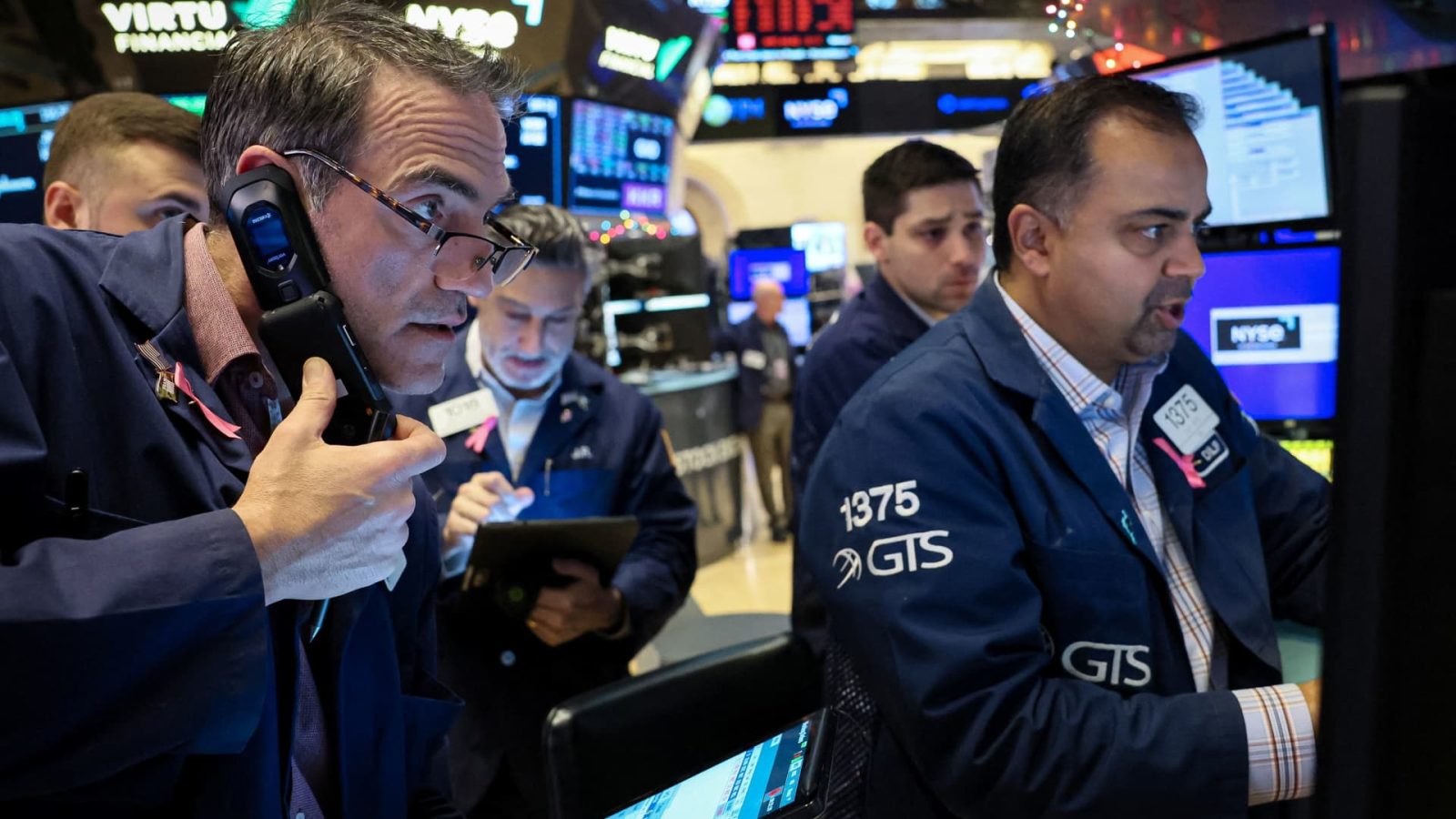Earnings from America’s biggest banks are in, and they were messy. Investors had to look past billions of dollars in special payments to replenish the government’s deposit backstop after the fallout from last year’s Silicon Valley Bank failure. Management teams were also trying to forecast the moving target of how many Federal Reserve interest rate cuts to expect this year. Here’s how our financial names, Morgan Stanley and Wells Fargo, stacked up against their peers. Investment banking While expanding more reliable revenue streams, Morgan Stanley’s investment banking operation is still a big business line. The same can be said of Goldman Sachs . Morgan Stanley reported a fourth-quarter exceeded estimate on adjusted earnings-per-share (EPS) of $1.13, excluding a few one-time charges. One of those items, which all the major banks had in Q4, was a Federal Deposit Insurance Corporation (FDIC)–imposed fee related to the SBV-driven regional banking crisis, which caused an industry confidence crisis. Revenue of $12.9 billion for the final three months of 2023 was down 10% from the year-ago period but it did beat expectations. In a breakdown of better-than-expected revenue at its three operating units, Institutional Securities, which includes investment banking pulled in $4.94 billion, Wealth Management saw $6.65 billion, and Investment Management had $1.46 billion. MS YTD mountain Morgan Stanley (MS) performance year-to-date On earnings day last week, Morgan Stanley shares came under pressure on CEO Ted Pick’s conservative macro outlook and the firm’s Wealth Management number. Pick cited geopolitical issues as a potential headwind and said with rates higher in recent quarters, clients are parking their cash in less profitable money market funds. The stock was able to find its footing in Friday’s broader market rally that carried the S & P 500 to a new record high close. That strength in both Morgan Stanley and the market continued Monday. The Club’s take: Overall, Jim Cramer said this was an “unremarkable” quarter for Morgan Stanley, citing profitability around the firm’s now-largest operating segment, Wealth Management. Management previously issued a goal of 30% operating margins for the division, but later said the firm was still far from that milestone. “When you get this kind of cautious commentary from a new CEO, my gut says he’s simply trying to lower expectations to play the [under promise, over deliver] game,” Jim said. “Plus, Morgan Stanley’s paying you to wait with that 4% yield, and they’re right in there buying with you thanks to their aggressive buyback.” We’re not throwing in the towel on Morgan Stanley yet. After earnings last Tuesday, we raised our price target on the bank stock to $98 per share from $95. We still see strong prospects in the Investment Banking segment, which has lagged for several quarters on the back of macro uncertainty. Our view is that capital markets will recover as expectations of lower Fed policy rates this year could usher in a pickup in the long-muted mergers and acquisitions (M & A) and initial public offerings (IPO) markets. “If it sells off any more, maybe coming back down to around $80, or even the $70s, we might even buy more,” Jim said about the stock’s post-earnings dip. “Call me surprised at how little leverage this Wealth Management business has. Can they really not make more money off a client?” GS YTD mountain Goldman Sachs (GS) performance year-to-date Goldman’s Q4 results were received much better. The stock jumped on earnings day, highlighted by better-than-expected Asset and Wealth Management performance. Segment revenue surged 23% year-over-year to $4.39 billion. Goldman’s Investment Banking segment underperformed for another quarter. During the post-earnings call with analysts, CEO David Solomon said he was “pretty optimistic” about a pickup in deal-making activity in the second half of 2024, though. The Club’s take: Jim mulled switching out of Morgan Stanley and into Goldman Sachs after the releases. Goldman Sachs could be a cleaner investment banking recovery play and both have wealth management businesses. However, for now, we’re sticking with Morgan Stanley because we’re still believers in its IB prospects and continue to think Pick will prove to be cautious in his outlook given he just took the reigns as CEO. Money center banks Then, there are money centers and traditional lenders like Wells Fargo and JPMorgan Chase . Wells Fargo’s better-than-anticipated quarterly release on Jan. 12 coupled with management’s $10 billion multiyear cost-saving program left us positive on results. Earnings initially looked like a miss, akin to Morgan Stanley and the other major banks due to the FDIC special assessment and other one-time items. But adjusted EPS of $1.29 beat in Q4 and so did revenue of $20.48 billion. WFC YTD mountain Wells Fargo (WFC) year-to-date performance The stock dropped more than 3% on earnings day as the bank said net interest income (NII) for 2024 could come in lower year over year than 2023’s $52.38 billion. The warning accounts for the Fed’s seemingly more dovish stance on monetary policy. So, if the central bank does not cut rates as much as the market thinks, the company’s guidance on NII could be too pessimistic. Wells Fargo shares bounced on Friday and Monday. The Club’s take: We had warned members the bank stock could decline on a “sell-the-news” situation with expectations high on a big run over the past couple of months into the release. We’re also monitoring Wells Fargo’s exposure to the ailing commercial real estate market, as the firm has the largest office real estate portfolios out of the nation’s largest banks. Management acknowledged that Wells has started to see some losses in the segment. Alongside earnings, they tried to assuage investors by saying that the firm “has a rigorous monitoring process and continues to de-risk and reduce exposure.” Overall, the quarter didn’t discourage our long-term bull case on Wells Fargo as a multiyear recovery play. Once financial regulators lift the firm’s asset cap — and we do think it’s just a matter of time — Wells Fargo will be able to expand its balance sheet — and, in theory, rake in more profits. JPM YTD mountain JPMorgan Chase performance year-to-date JPMorgan reported quarterly results before the opening bell on Jan. 12 as well. Similar to other big banks, Q4 profit declined after paying one-time fees connected to 2023’s regional bank failures and the instability in the industry. Revenue of $39.94 billion beat. JPMorgan shares dropped on earnings day but far less than Wells Fargo. With gains Monday, the stock was on a three-session winning streak. The Club’s take: Similar to Wells Fargo, CEO Jamie Dimon said 2023 was solid on better-than-expected results on both credit quality and NII. The bank said it raked in almost $50 billion of profits last year, with over $4 billion of that from JPMorgan’s rescue of failed First Republic. JPMorgan forecast full-year 2024 NII at $90 billion, around the same level as 2023. (Jim Cramer’s Charitable Trust is long WFC, MS. See here for a full list of the stocks.) As a subscriber to the CNBC Investing Club with Jim Cramer, you will receive a trade alert before Jim makes a trade. Jim waits 45 minutes after sending a trade alert before buying or selling a stock in his charitable trust’s portfolio. If Jim has talked about a stock on CNBC TV, he waits 72 hours after issuing the trade alert before executing the trade. THE ABOVE INVESTING CLUB INFORMATION IS SUBJECT TO OUR TERMS AND CONDITIONS AND PRIVACY POLICY , TOGETHER WITH OUR DISCLAIMER . NO FIDUCIARY OBLIGATION OR DUTY EXISTS, OR IS CREATED, BY VIRTUE OF YOUR RECEIPT OF ANY INFORMATION PROVIDED IN CONNECTION WITH THE INVESTING CLUB. NO SPECIFIC OUTCOME OR PROFIT IS GUARANTEED.
Earnings from America’s biggest banks are in, and they were messy.
Investors had to look past billions of dollars in special payments to replenish the government’s deposit backstop after the fallout from last year’s Silicon Valley Bank failure. Management teams were also trying to forecast the moving target of how many Federal Reserve interest rate cuts to expect this year.
Here’s how our financial names, Morgan Stanley and Wells Fargo, stacked up against their peers.
Read the full article here












Leave a Reply